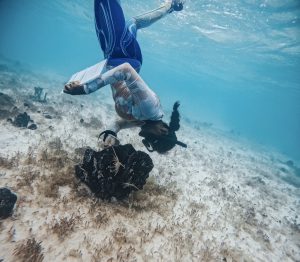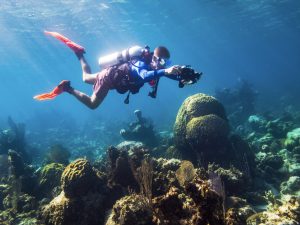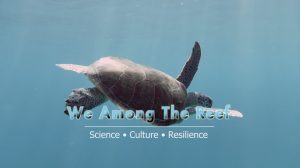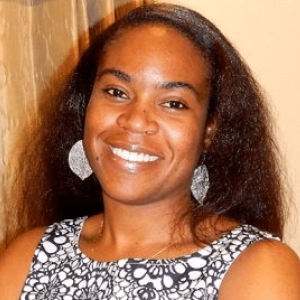
Lack of regulations and increased fishing pressure likely to blame
Herbivorous parrotfish play critical ecological functions in sustaining resilient coral reefs which protect coastlines, provide food and support livelihoods. However, in The Bahamas, parrotfish are increasingly being targeted and to date, no fishery regulations have been implemented.
Assessing the distribution, diversity, abundance and habitat use of parrotfish are important for preserving coral reefs and to provide input for managing fishing pressure on their populations.
The Perry Institute for Marine Science (PIMS) is excited to share that Dr. Krista Sherman, Maya Gomez, Thomas Kemenes and Dr. Craig Dahlgren recently published a new open access article entitled, “Spatial and Temporal Variability in Parrotfish Assemblages on Bahamian Coral Reefs”, in the journal Diversity.
PIMS has been monitoring the status of reefs throughout The Bahamas for decades using Atlantic & Gulf Rapid Reef Assessment (AGRRA) surveys. Our team analyzed AGRRA data collected between 2011 and 2019 to examine the status of parrotfish populations across 26 reefs around two islands in The Bahamas; New Providence and Rose Island. We also sought to determine whether the growing fishery has impacted parrotfish populations.
Key findings revealed a 59% decline in parrotfish density and noticeable changes in size composition over time, with a shift to smaller size fish and loss of large adults across reef sites. The authors reported that “only 3% of parrotfish were large/terminal phase adults”. These changes were evident in both ecologically important parrotfish species as well as others that are being caught for subsistence and commercial fishing.

So why is this alarming? Parrotfish populations in The Bahamas have typically been among the most abundant in the Caribbean, but these latest results demonstrate that mean densities around many (58%) of the reefs surveyed are now lower than regional values with significant declines occurring in a few parrotfish species. Additionally, large parrotfish are known to be more effective at grazing (i.e. removing macroalgae) than smaller fish, so the loss of these large herbivores has implications for the condition or health of coral reefs habitats.
Dr. Sherman, lead author and Senior Scientist for PIMS’ Fisheries Research & Conservation Program, said, “Our results highlight the importance of monitoring and emphasize the urgency of implementing science-based strategies to sustainably manage the fishery and protect these ecologically essential herbivores, which are vital components of coral reefs.”
To learn more about the suggested management recommendations and additional results read the paper and visit perryinstitute.org.

Unveiling Coral Reef Biodiversity: Insights from ARMS Monitoring Structures
An ARM teeming with new coral recruits and a diversity of marine life, highlighting reef recovery and biodiversity Understanding Coral Reef Biodiversity Most new PhDs

7 Essential Insights from COP16: Tackling Coral Reef Conservation Challenges Amid Climate Change
United #ForCoral: Experts, advocates, and leaders from across the globe join forces at COP16 for the #ForCoral conference, hosted by the International Coral Reef Initiative.

Fieldwork Wrap-Up: Strengthening MPA Management in The Bahamas
Marine protected areas (MPAs) are critical tools in the conservation of marine species and habitats, safeguarding reefs, seagrasses, and mangroves that provide vital ecosystem services

Coral Reef Monitoring with Photogrammetry: A New Era in Reef Health Assessment
Coral reefs are some of the most biodiverse ecosystems on the planet, providing crucial habitat for marine life and protecting coastal regions from erosion. Yet,

Watch “We Among the Reef:” A Documentary on the Abaco Barrier Reef
The Perry Institute for Marine Science invites you to watch “We Among the Reef,” a compelling documentary that illuminates the significance of the Abaco Barrier

Guardians of the Deep: With Training from PIMS, Key Government Staff Become PADI Certified Divers
Akehia Thompson (DMR), Quetta Gibson (DMR), and Gilles Deal (DEPP) share a moment of camaraderie in their scuba gear, embarking on their training journey with




